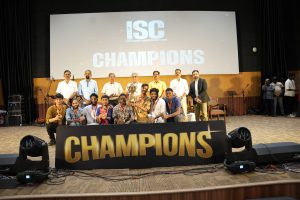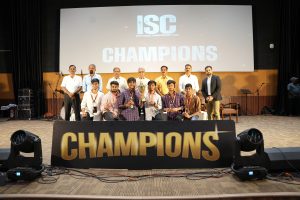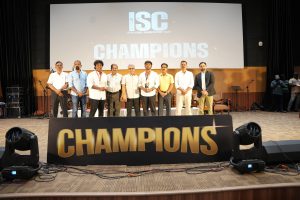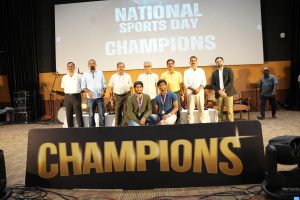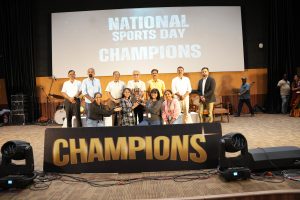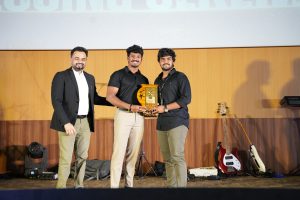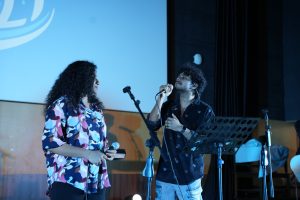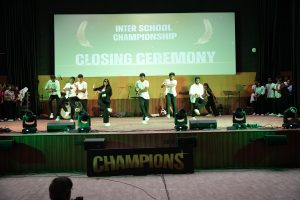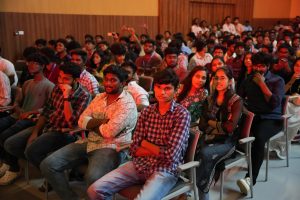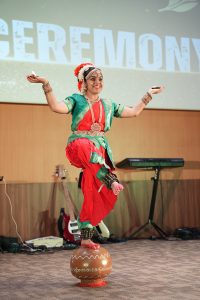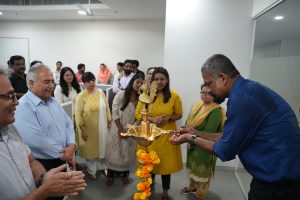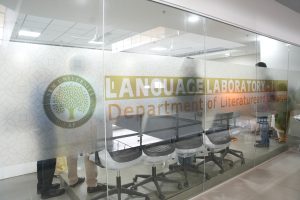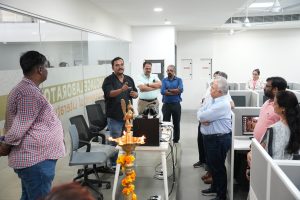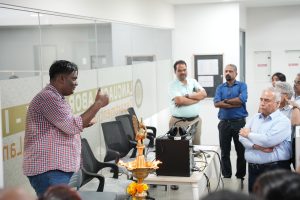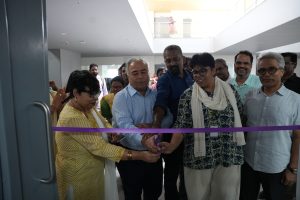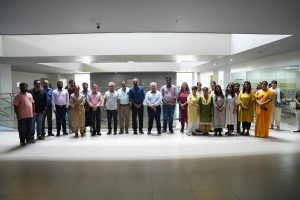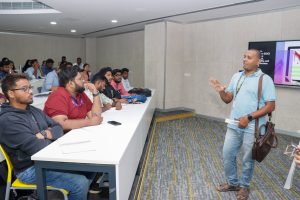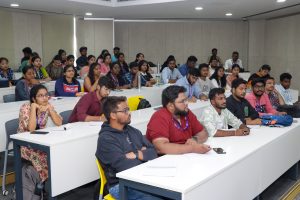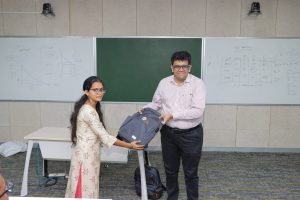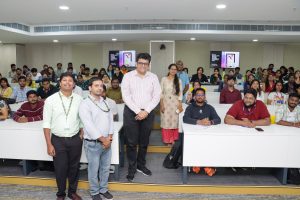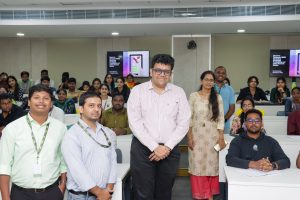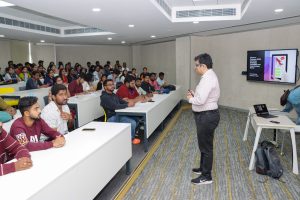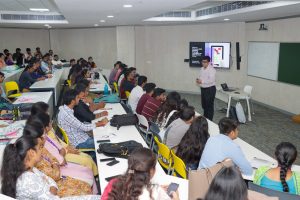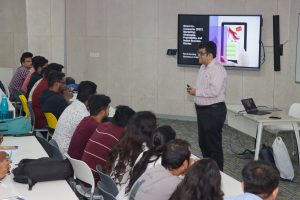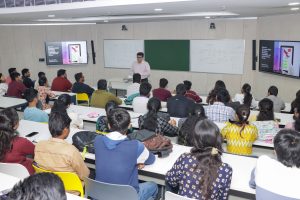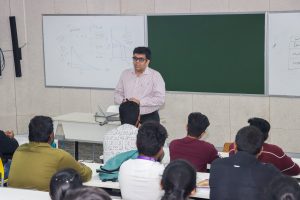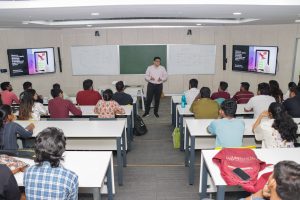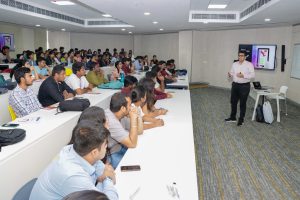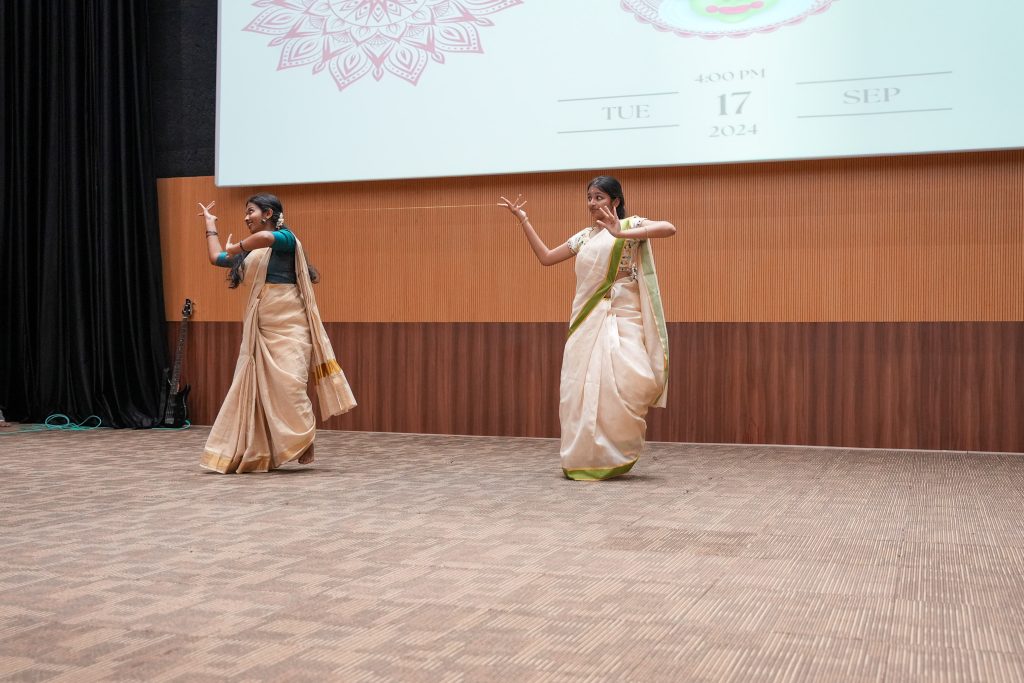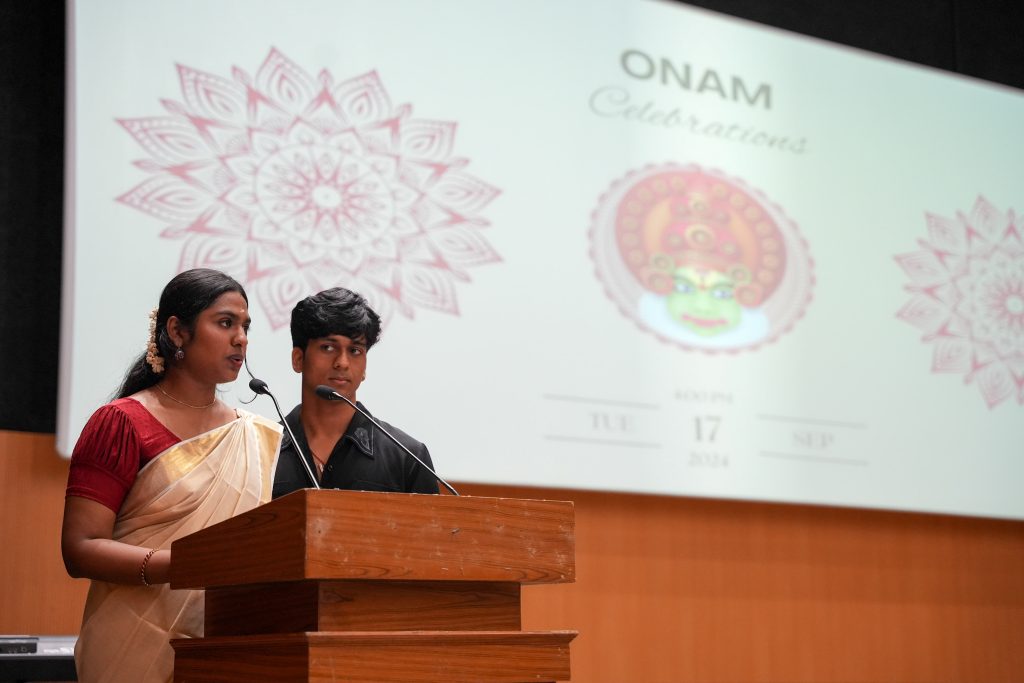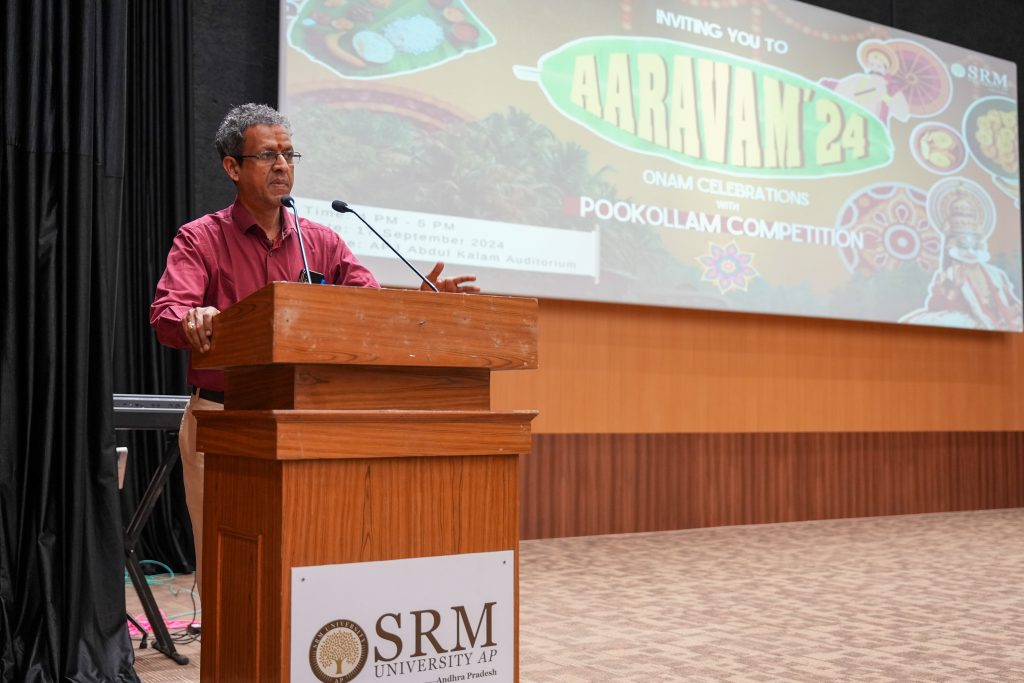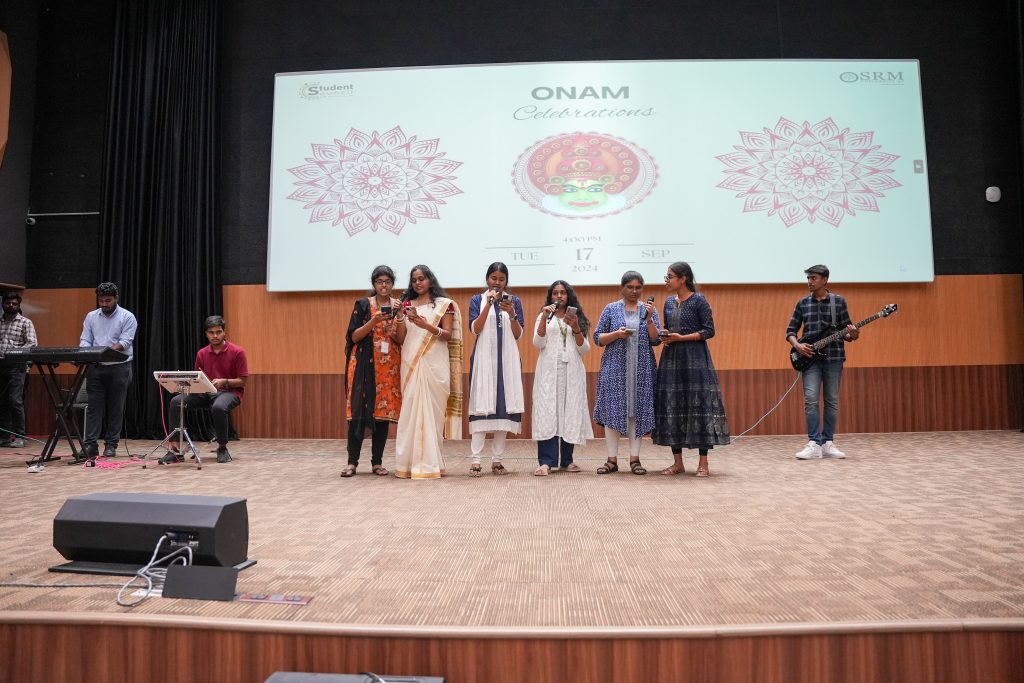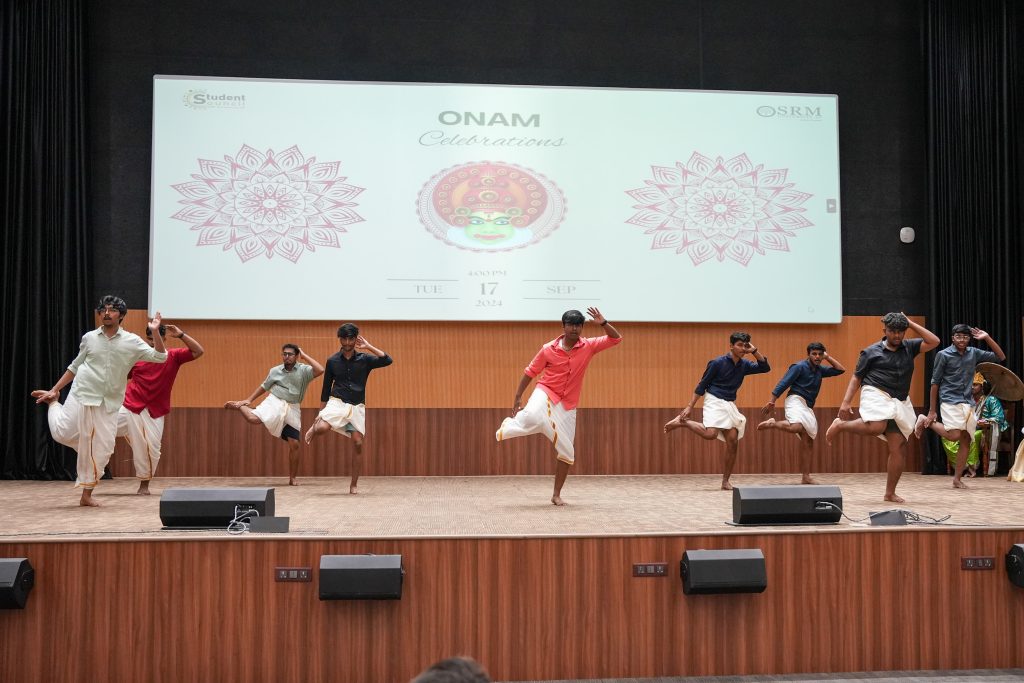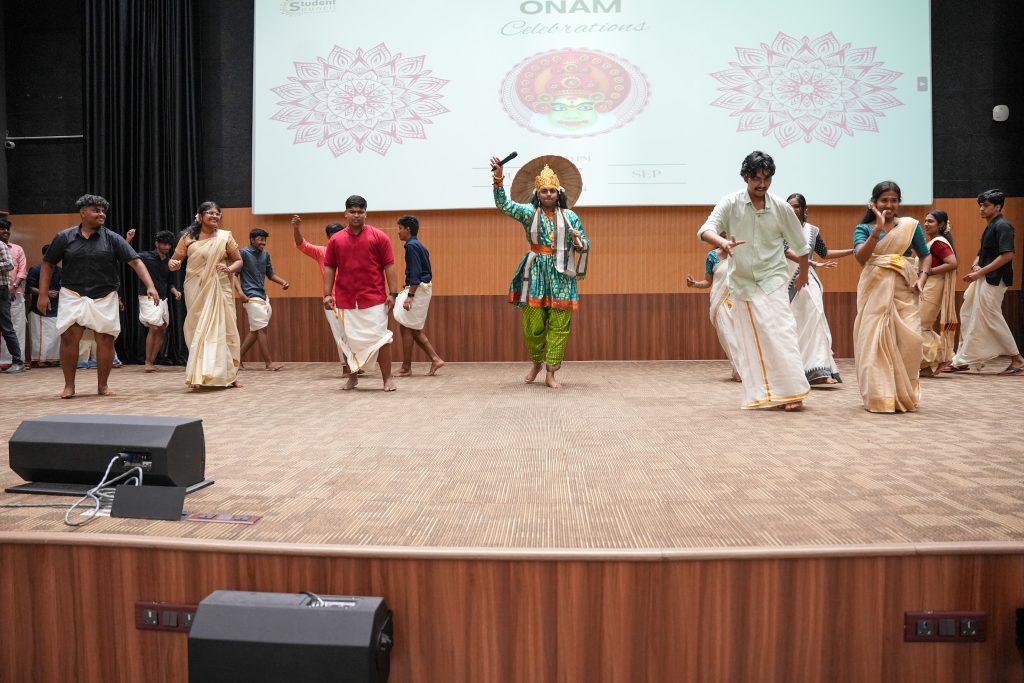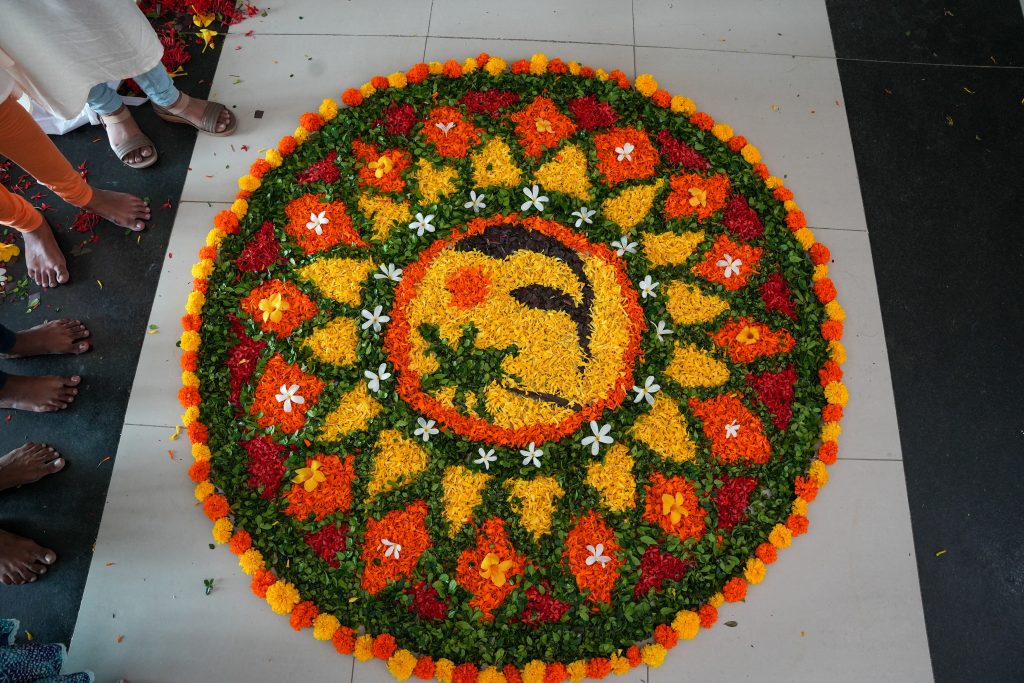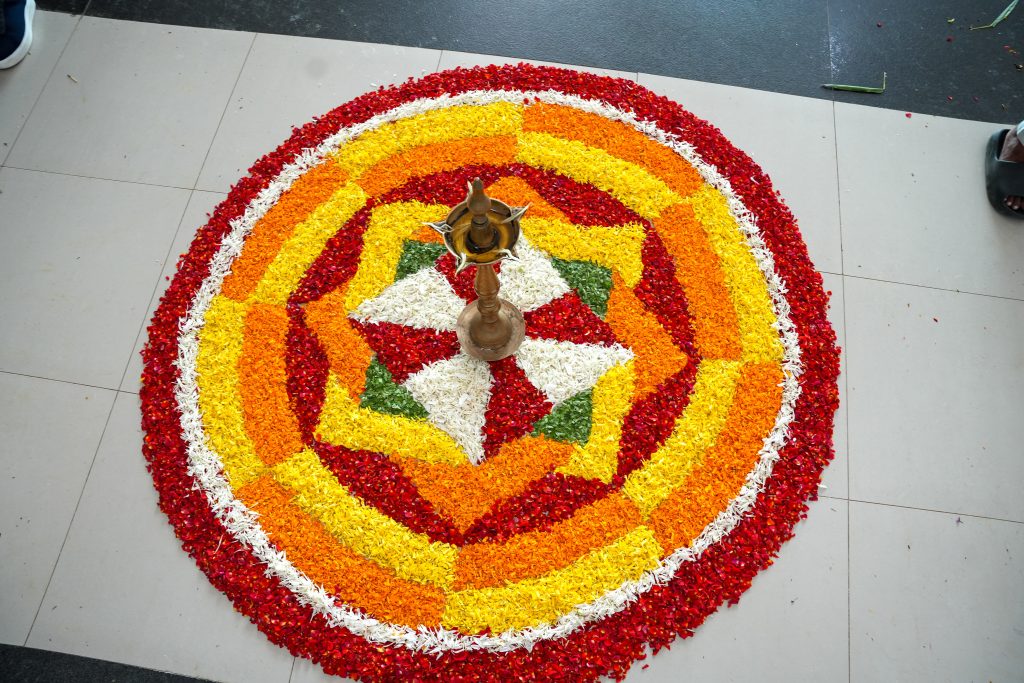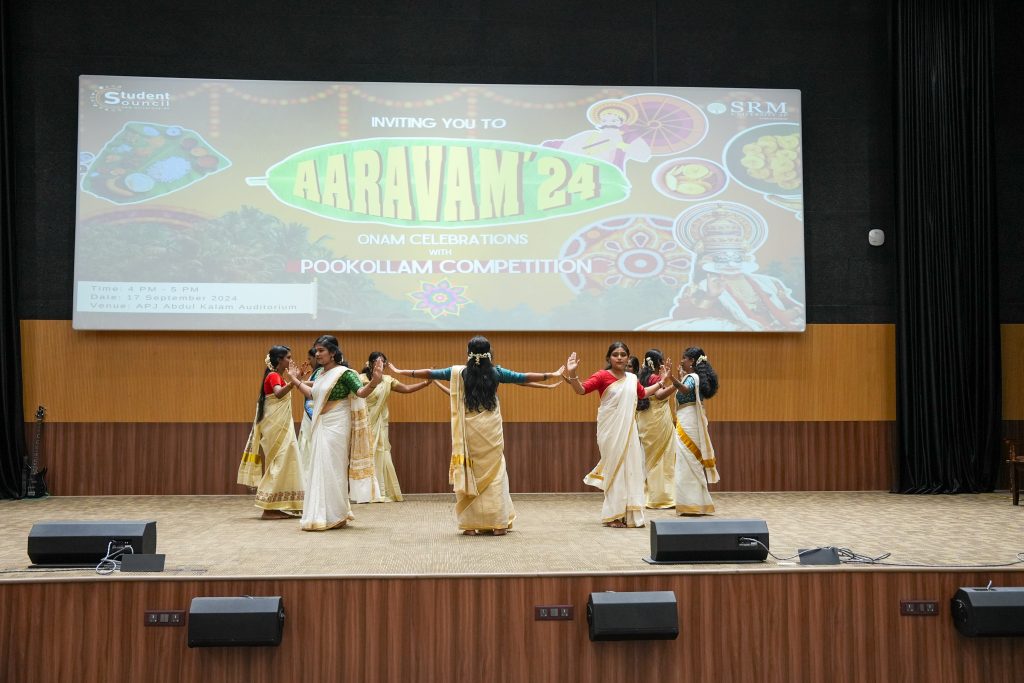Professors Develop Fish Scale SERS Substrates for Pollutant Detection
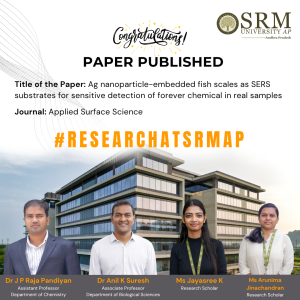 Surface-Enhanced Raman Spectroscopy (SERS), a technique that helps scientists detect tiny amounts of substances, is used for checking pollutants in our environment and the food we eat. However, using this method can be tricky because sometimes other substances can interfere. To overcome these challenges, scientists are working on better ways to prepare samples and analyse the data with a quick and easy way to find harmful pollutants called PFOSA in human urine, soil, and water using a fish scale-based substrate. This remarkable research titled, “Ag nanoparticle-embedded fish scales as SERS substrates for sensitive detection of forever chemical in real samples” by faculty members from the Department of Chemistry and Department of Biological Sciences, Dr J P Raja Pandiyan and Dr Anil K Suresh, along with their research scholars, Ms Jayasree K and Ms Arunima J, have opened up new avenues, demonstrating a significant advancement in the field of science.
Surface-Enhanced Raman Spectroscopy (SERS), a technique that helps scientists detect tiny amounts of substances, is used for checking pollutants in our environment and the food we eat. However, using this method can be tricky because sometimes other substances can interfere. To overcome these challenges, scientists are working on better ways to prepare samples and analyse the data with a quick and easy way to find harmful pollutants called PFOSA in human urine, soil, and water using a fish scale-based substrate. This remarkable research titled, “Ag nanoparticle-embedded fish scales as SERS substrates for sensitive detection of forever chemical in real samples” by faculty members from the Department of Chemistry and Department of Biological Sciences, Dr J P Raja Pandiyan and Dr Anil K Suresh, along with their research scholars, Ms Jayasree K and Ms Arunima J, have opened up new avenues, demonstrating a significant advancement in the field of science.
Abstract:
Surface-enhanced Raman spectroscopy (SERS) has emerged as one of the most promising analytical tools in recent years due to its advantageous features such as high sensitivity, specificity, ease of operation, and rapid analysis. These attributes make SERS particularly well-suited for environmental and food analysis. However, detecting target analytes in real samples using SERS faces several challenges, including matrix interference, low analyte concentrations, sample preparation complexity, and reproducibility issues. Additionally, the chemical complexity of pollutants and environmental factors can impact SERS measurements. Overcoming these hurdles demands optimised experimental conditions, refined sample preparation methods, and advanced data analysis techniques, often necessitating interdisciplinary collaborations for effective analysis. Therefore, our focus lies in the development of various methods for fabricating SERS substrates, pretreating analytes, and devising sample preparation strategies. These efforts aim to enable the detection of analytes like Perfluorooctane sulfonamide (PFOSA) – a toxic environmental pollutant within complex real samples, including human urine, lake water, and soil samples.
Practical / Social Implications:
SERS Community: Introducing a facile fabrication method for developing filter paper-based substrates, utilizing evaporation-induced self-assembly methods with the aid of 96-well plates. These substrates boast exceptional sensitivity and uniformity, exhibiting a relative standard deviation (RSD) of 8.2%. They offer easy fabrication and serve as effective SERS substrates for various applications.
Industry and Government Bodies: This invention plays a pivotal role in assessing contamination in food and water bodies, serving as a crucial tool in monitoring
environmental contamination through on-site analysis with portable instruments. It ensures adherence to regulatory standards and safeguards public health.
Research: Beyond its practical applications, the invention supports scientific research endeavours focused on identifying microplastic contaminants in real-world samples using portable Raman spectrometers. This not only aids ongoing research but also paves the way for future studies in this critical field.
Collaborations:
1. Dr Hemanth Noothalapati Raman Project Center for
Medical and Biological
Applications, Shimane
University, Matsue 690-8504,
Japan
2. Dr Murali Krishna C. Advanced Centre for
Treatment, Research and
Education in Cancer, Tata
Memorial Centre, Navi
Mumbai 410210, India
3. Dr Soma Venugopal University of Hyderabad, India
Future Research Plans:
Harnessing SERS for the Detection of Emerging Contaminants in Environmental and Food Matrices
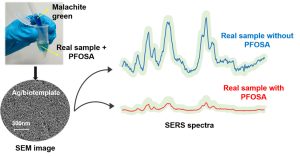
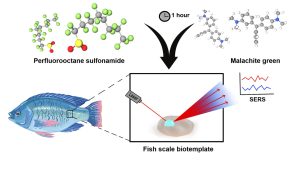
- Published in Chemistry-news, Departmental News, News, Research News
Enhancing Vehicle Security with Blockchain and Hybrid Computing
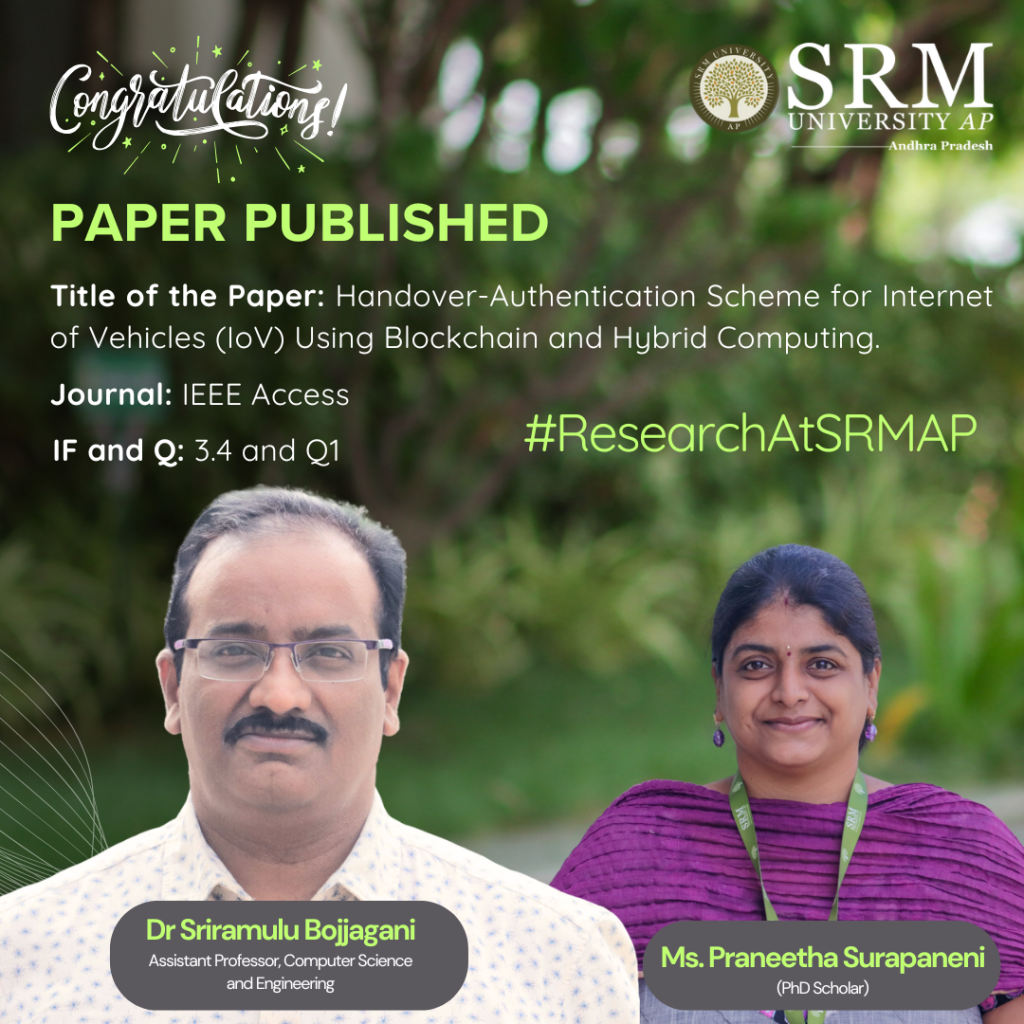 Dr Sriramulu Bojjagani, Assistant Professor, Department of Computer Science and Engineering and his research scholar, Ms Praneeta Supraneni, have proposed a secure and novel way to safeguard cars from being hacked, data breaches, and unauthorised access. Their research paper titled “Handover-Authentication Scheme for the Internet of Vehicles (IoV) using Blockchain and Hybrid Computing” will now improve transparency and traceability of your cars. Read the interesting abstract to learn more!
Dr Sriramulu Bojjagani, Assistant Professor, Department of Computer Science and Engineering and his research scholar, Ms Praneeta Supraneni, have proposed a secure and novel way to safeguard cars from being hacked, data breaches, and unauthorised access. Their research paper titled “Handover-Authentication Scheme for the Internet of Vehicles (IoV) using Blockchain and Hybrid Computing” will now improve transparency and traceability of your cars. Read the interesting abstract to learn more!
Abstract:
The advancements in telecommunications are significantly benefiting the Internet of Vehicles (IoV) in various ways. Minimal latency, faster data transfer, and reduced costs are transforming the landscape of IoV. While these advantages accompany the latest improvements, they also expand cyberspace, leading to security and privacy concerns. Vehicles rely on trusted authorities for registration and authentication processes, resulting in bottleneck issues and communication delays. Moreover, the central trusted authority and intermediate nodes raise doubts regarding transparency, traceability, and anonymity. This paper proposes a novel vehicle authentication handover framework leveraging blockchain, IPFS, and hybrid computing. The framework uses a Proof of Reputation (PoR) consensus mechanism to improve transparency and traceability and the Elliptic Curve Cryptography (ECC) cryptosystem to reduce computational delays. The suggested system assures data availability, secrecy, and integrity while maintaining minimal latency throughout the vehicle re-authentication process. Performance evaluations show the system’s scalability, with creating keys, encoding, decoding, and registration operations done rapidly. Simulation is performed using SUMO to handle vehicle mobility in IoV environment. The findings demonstrate the practicality of the proposed framework in vehicular networks, providing a reliable and trustworthy approach for IoV communication
Practical Implementation / Social Implications:
The practical application of this research can significantly improve the safety and reliability of autonomous vehicles and connected vehicle networks. By securing the handover process, it reduces the risk of hacking, data breaches, and unauthorized access, making connected vehicle systems safer for the public and contributing to the development of smart transportation infrastructures.
Future Research Plans:
Moving forward, we plan to focus on optimizing blockchain solutions for large-scale IoT and smart city applications, with a particular interest in improving consensus mechanisms and security protocols for real-time operations, such as autonomous driving and smart energy grids.
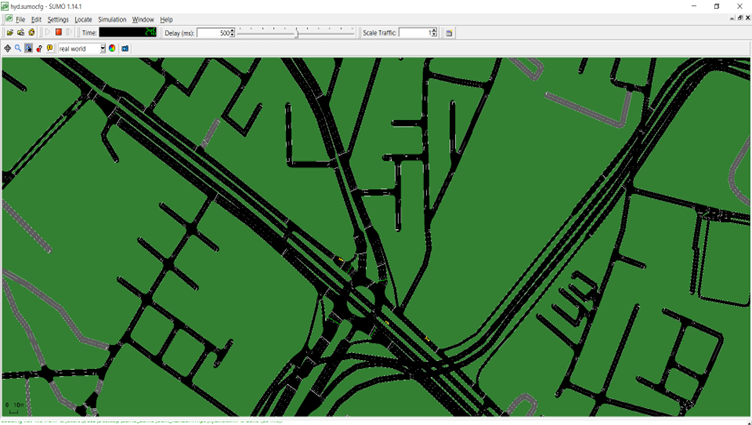
- Published in CSE NEWS, Departmental News, News, Research News
The Vision of ‘Moner Manush’ through the Lens of Dr Sayantan’s Research
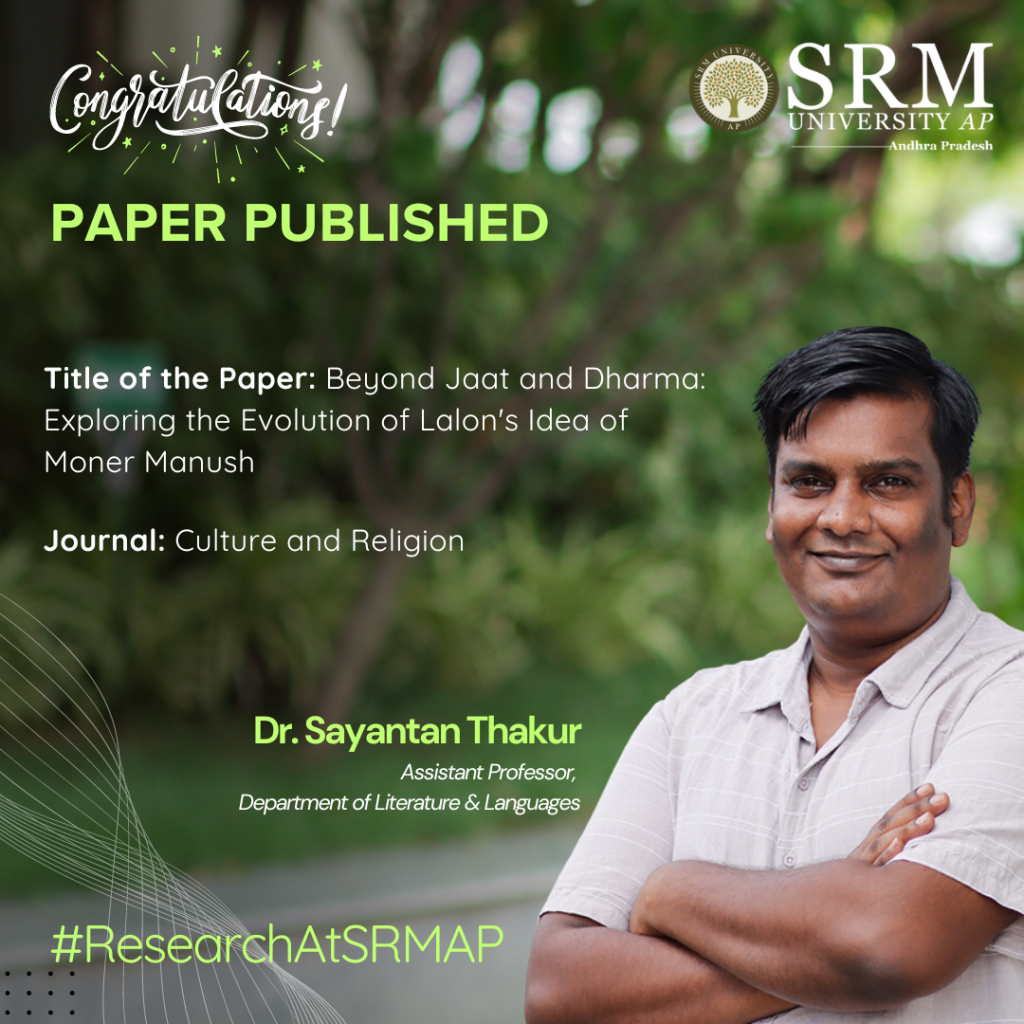
Today, we approach the topics of caste and religion with great sensitivity, aware of the deep-rooted complexities they carry. Yet, here was a character who transcended these societal boundaries, evolving into the embodiment of ‘Moner Manush’—a figure who rose above the constraints of identity to embrace a higher sense of spiritual unity and inclusiveness. Dr Sayantan Thakur, Assistant Professor at the Department of Literature and Languages closely reads into the intricacies of Lalon’s conceptualisation of man and the caste barriers in his research paper.
Abstract:
The paper entitled ‘Beyond ‘Jaat’ and Dharma: Exploring the Evolution of Lalon’s Idea of ‘Moner Manush’ delves into an in-depth exploration of Lalon’s conceptualization of ‘Moner Manush,’ transcending the conventional confines of ‘Jaat’ (caste) and Dharma (religion). Through a nuanced analysis of Lalon’s evolving perspectives, the study traces the transformative journey of the idea of ‘Moner Manush.’ By dissecting the lyrical and philosophical aspects, the paper illuminates how Lalon’s spiritual musings challenge societal norms, promoting a universal ethos that goes beyond distinctions. This inquiry aims to unravel the evolving nature of Lalon’s concept of ‘Moner Manush’ and its enduring significance in fostering inclusivity and spiritual interconnectedness, surpassing the limitations of caste and religion.
Practical Implementation and Social Implications:
The practical implementation of my research on “Beyond ‘Jaat’ and Dharma: Exploring the Evolution of Lalon’s Idea of ‘Moner Manush'” has profound social implications, particularly in fostering inclusivity and breaking down societal barriers. By promoting Lalon’s vision of transcending caste (jaat) and religious (dharma) divisions, this research advocates for a more egalitarian society where people are valued for their inner virtues, not external identities. In practical terms, this philosophy can be integrated into education, community-building, and social reform initiatives to encourage tolerance, empathy, and unity among diverse groups.
In multicultural societies, teaching Lalon’s ideas in schools and community programs can help dismantle deep-seated prejudices and promote cross-cultural understanding. Socially, the emphasis on the Moner Manush—the ideal human being—can encourage individuals to focus on self-reflection, moral development, and compassion, creating a more harmonious coexistence. Additionally, his philosophy can inform contemporary debates on identity politics, helping people prioritize human connections over rigid societal structures.
Future Research Plans
Regional Literature in Translation
Tantric Tradition and Eastern Indian Literature
Folk Music of Bengal
Indian Philosophy, Aesthetics & Literature
- Published in Departmental News, English Current Happenings, English news, News, Research News
Breakthrough in Mathematical Research: Dr Subha Sandeep Repaka’s Innovative Study on Unitary Groups
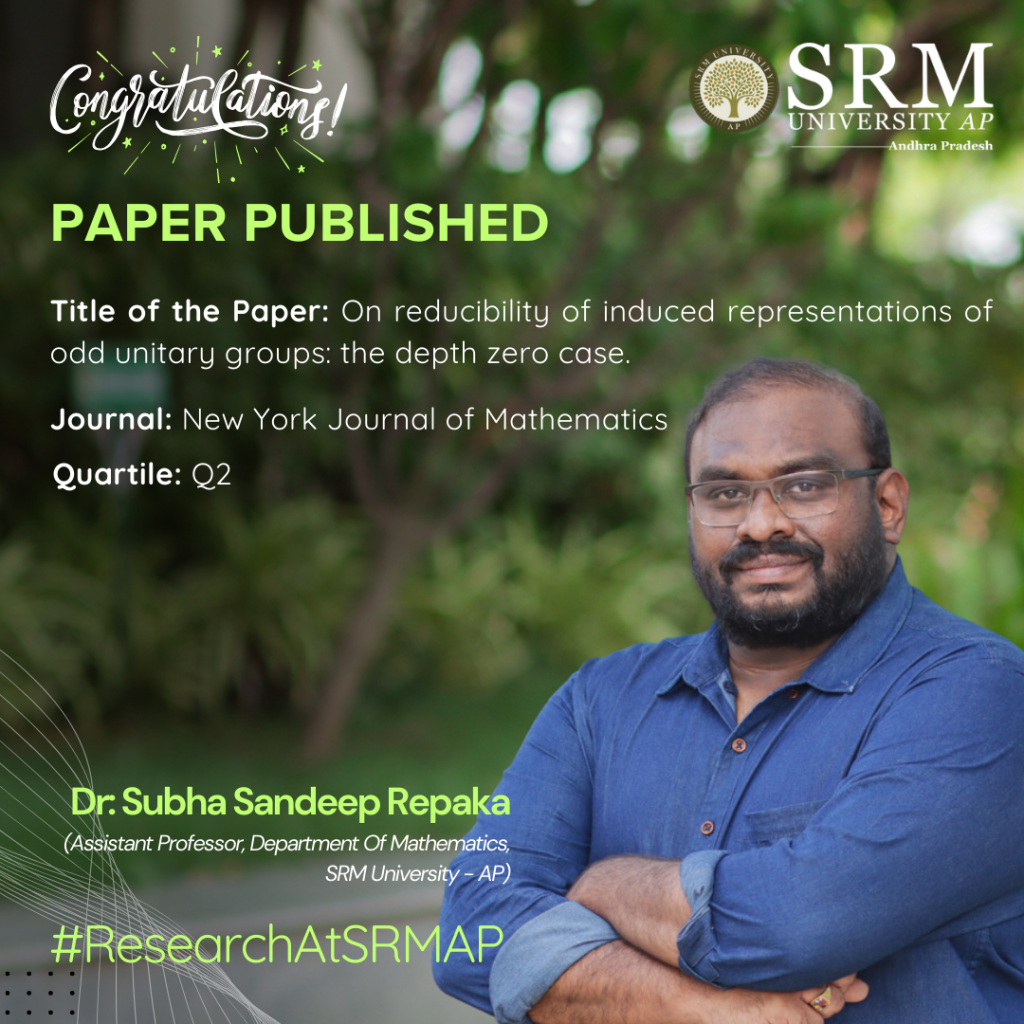
The Department of Mathematics, SRM University-AP, is pleased to announce that Assistant Professor Dr Subha Sandeep Repaka has published a significant research paper titled “On Reducibility of Induced Representations of Odd Unitary Groups: The Depth Zero Case.” This accomplishment reflects Dr Repaka’s expertise and dedication to advancing mathematical research, further enriching the academic contributions of the department and the university.
Abstract:
We study a problem concerning parabolic induction in certain $p$-adic unitary groups. More precisely, for $E/F$ a quadratic extension of $p$-adic fields the associated unitary group $G=\mathrm{U}(n,n+1)$ contains a parabolic subgroup $P$ with Levi component $L$ isomorphic to $\mathrm{GL}_n(E) \times \mathrm{U}_1(E)$. Let $\pi$ be an irreducible supercuspidal representation of $L$ of depth zero. We use Hecke algebra methods to determine when the parabolically induced representation $\iota_P^G \pi$ is reducible.
Future Research Plans:
We would like to solve the same problem which I had solved in this paper for the groups U(n,n) and U(n,n+1) over p-adic fields using L-Functions which is a very novel approach.
The link to the article:
http://nyjm.albany.edu/j/2024/30-50.html

- Published in Departmental News, Math News, News, Research News
Celebrating Sporting Excellence at Inter School Sports Championship
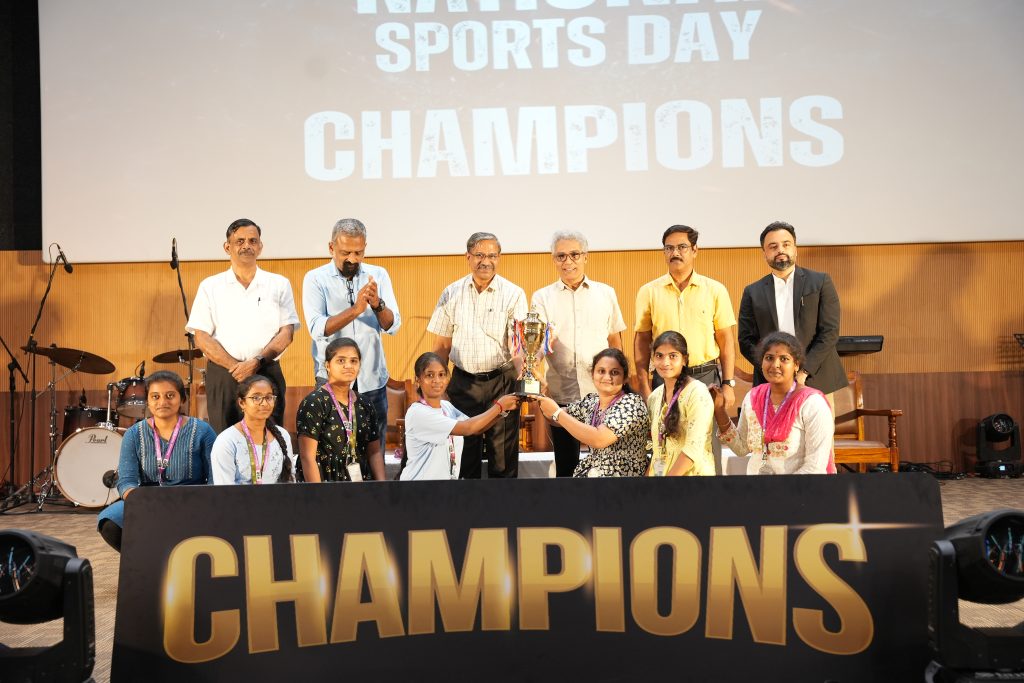 The Directorate of Sports at SRM University-AP proudly hosted the grand closing ceremony of the Inter School Sports Championship (ISC), a celebration of sportsmanship, teamwork, and dedication among students. The event, attended by esteemed guests including Chief Guest Naveen Chary, a renowned fitness influencer, Registrar Dr R Premkumar, Deans, Directors, and a vibrant crowd of students, marked the culmination of a remarkable four-week journey.
The Directorate of Sports at SRM University-AP proudly hosted the grand closing ceremony of the Inter School Sports Championship (ISC), a celebration of sportsmanship, teamwork, and dedication among students. The event, attended by esteemed guests including Chief Guest Naveen Chary, a renowned fitness influencer, Registrar Dr R Premkumar, Deans, Directors, and a vibrant crowd of students, marked the culmination of a remarkable four-week journey.
The ISC Championship witnessed the enthusiastic participation of 2,247 students from all three schools: the School of Engineering and Sciences, the Paari School of Business, and the Easwari School of Liberal Arts. Participants showcased their skills in a variety of sports, promoting camaraderie and school spirit throughout the event.
Among the games, cricket was the most popular, attracting 900 participants; Badminton followed with 482 participants and volleyball with 256 participants. The football, basketball, and chess competitions also saw enthusiastic participation, with 180, 102, and 167 players, respectively. The School of Engineering and Sciences (SEAS) emerged as the triumphant winner of the prestigious rolling trophy.
“This championship has not only highlighted our students’ athletic abilities but has also been instrumental in cultivating a culture of sportsmanship at SRM University-AP,” said Dr Dhiraj Parasher, Director of Sports, SRM University-AP. “It has opened pathways for students to consider sports as a viable career option, enriching their overall university experience.”
The closing ceremony featured an engaging live performance by Band Kadali, along with captivating classical and Western dance performances by talented students.
In his address, Registrar Dr R Premkumar reflected on the significance of the event: “As we celebrate these achievements, let us carry forward the enthusiasm and lessons learned during this championship into all our future endeavours, both in sports and academics. The friendships forged and experiences gained here will resonate within our community for years to come.”
The ISC Championship has proven to be more than just a competitive event; it has served as a platform for personal growth, team spirit, and the forging of lasting bonds among students, making it a memorable chapter in the SRM University-AP journey.
- Published in Departmental News, News, Sports News
Revisiting Clément Baloup’s Comics through Dr Gusain’s Research
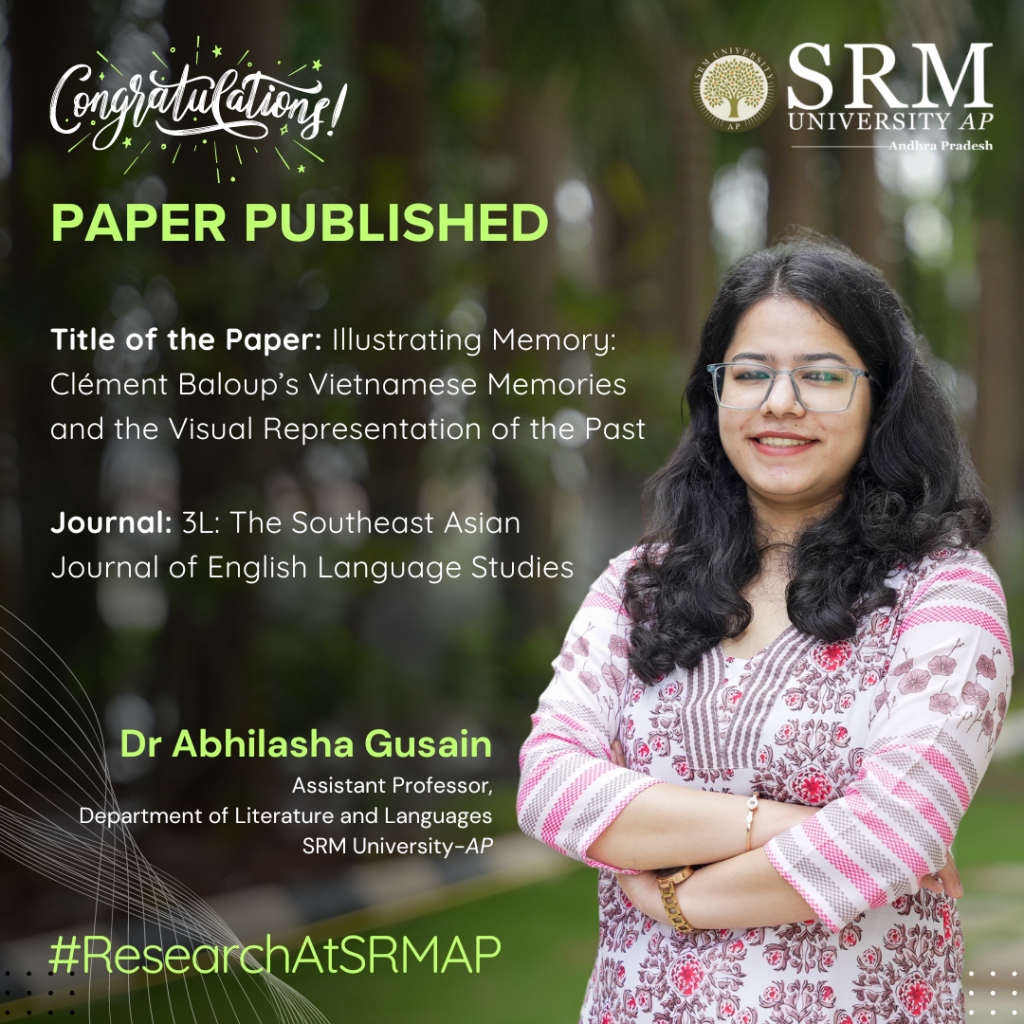
SRM University-AP is proud to announce that Dr Abhilasha Gusain, Assistant Professor in the Department of Literature and Languages has made an outstanding contribution to the academic world with her recent publication. Her research paper, “Illustrating Memory: Clément Baloup’s Vietnamese Memories and the Visual Representation of the Past,” featured in 3L: The Southeast Asian Journal of English Language Studies, a Q1-ranked journal known for its high impact in the field.
Abstract
The present study aims to highlight the role that Clément Baloup’s comics, Vietnamese Memories: Leaving Saigon (Volume 1) and Vietnamese Memories: Little Saigon (Volume 2), play in the creation of an alternate archive that validates the forgotten tales and the memories of a neglected past. These texts provide an alternate form of remembrance by materialising the past in the form of images. The two volumes present the unheard experiences of the Vietnamese diaspora that Baloup recorded during his travels to the different parts of France and the U.S. Such experiences bring to the forefront memories that are otherwise kept at the margins or suppressed by the dominant discourse. If not recorded, they will be lost forever. The counter-memory, thus, calls for a reassessment of the idea of a singular past that denies the marginalised memories. It claims representation and restoration in the cultural memory. As works of postmemory, these texts form a link between the past and the present through mediation and give memorability to unremembered accounts. The memories are illustrated, and hence, visual representation becomes important to the task of postmemory here.
Explanation of the Research:
This study emphasises the significance of visual representation in postmemory, showing how the two graphic narratives create a space for counter-memory and contribute to a reassessment of cultural memory by including marginalised experiences. Postmemory is a term used to describe how the memories of one generation are shaped by the stories and experiences of the previous generation. It often relates to events that people haven’t directly experienced, like wars or significant historical events, but feel a strong connection to through family stories, photographs, or cultural narratives. The paper illustrates how Baloup’s works serve as an alternate archival repository, creating a dynamic and inclusive cultural memory that reflects the complex, polyphonic nature of human experience; thus contributing significantly to the fields of comics studies and memory studies.
- Published in Departmental News, English Current Happenings, English news, News, Research News
Language Lab to Boost Student Communication Skills
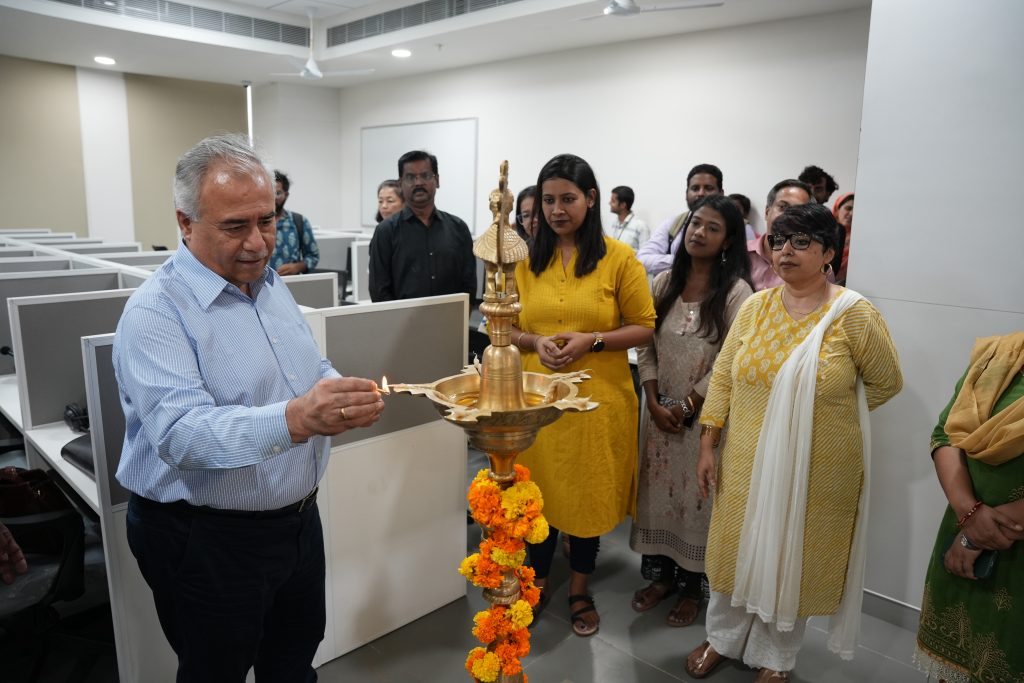 The Department of Literature and Languages at SRM University-AP celebrated the launch of its Language Lab, a state-of-the-art, 70-seater facility designed to enhance the Listening, Speaking, Reading, and Writing (LSRW) skills of its students.
The Department of Literature and Languages at SRM University-AP celebrated the launch of its Language Lab, a state-of-the-art, 70-seater facility designed to enhance the Listening, Speaking, Reading, and Writing (LSRW) skills of its students.
The inauguration was witnessed and officiated by the honourable Vice Chancellor, Prof. Manoj K Arora, along with Prof. Vishnupad, Dean- ESLA; Prof. C V Tomy, Dean-SEAS, Dr Vinayak Kalluri, Dean-Academic Affairs, Ms Suma N, CFAO; Dr Sayantan Thakur, Assistant Professor and Head; Dr Karthik Rajendran; Dr Srabani Basu, other faculty members, research scholars and students.
The laboratory, valued at 10 million rupees, is equipped with Sanako and Lanquill software, providing students with access to advanced resources. During the event, Vice Chancellor Prof. Manoj K Arora emphasised the value of communication he stated “Communication is an essential skill. With this lab, our students have a real opportunity to build those skills and contribute meaningfully to society.” he also voiced that, In future, the varsity will also be looking forward to opening this facility to the wider community so that more people can benefit from this resource.
Dr Thakur and Dr Amlan Baisya, Assistant Professors at the university, provided insights into the laboratory’s cutting-edge software and technology. They explained how these tools can significantly enhance the learning experience, making language acquisition more interactive and engaging. The faculty expressed their excitement about the opportunities this facility will create for both students and instructors alike.
Prof. Arora took a moment to commend the Department of Literature and Languages and the Directorate of Information Technology and Knowledge Management (ITKM) for their commitment to advancing education through innovative resources. He underscored the bright future ahead, not only for students but for the entire university community, as they leverage this new laboratory to improve communication skills that are vital in both academic and professional settings.
- Published in Departmental News, English Current Happenings, English news, News
Dr Sayantan’s Research Paper on Overcoming the Digital Divide
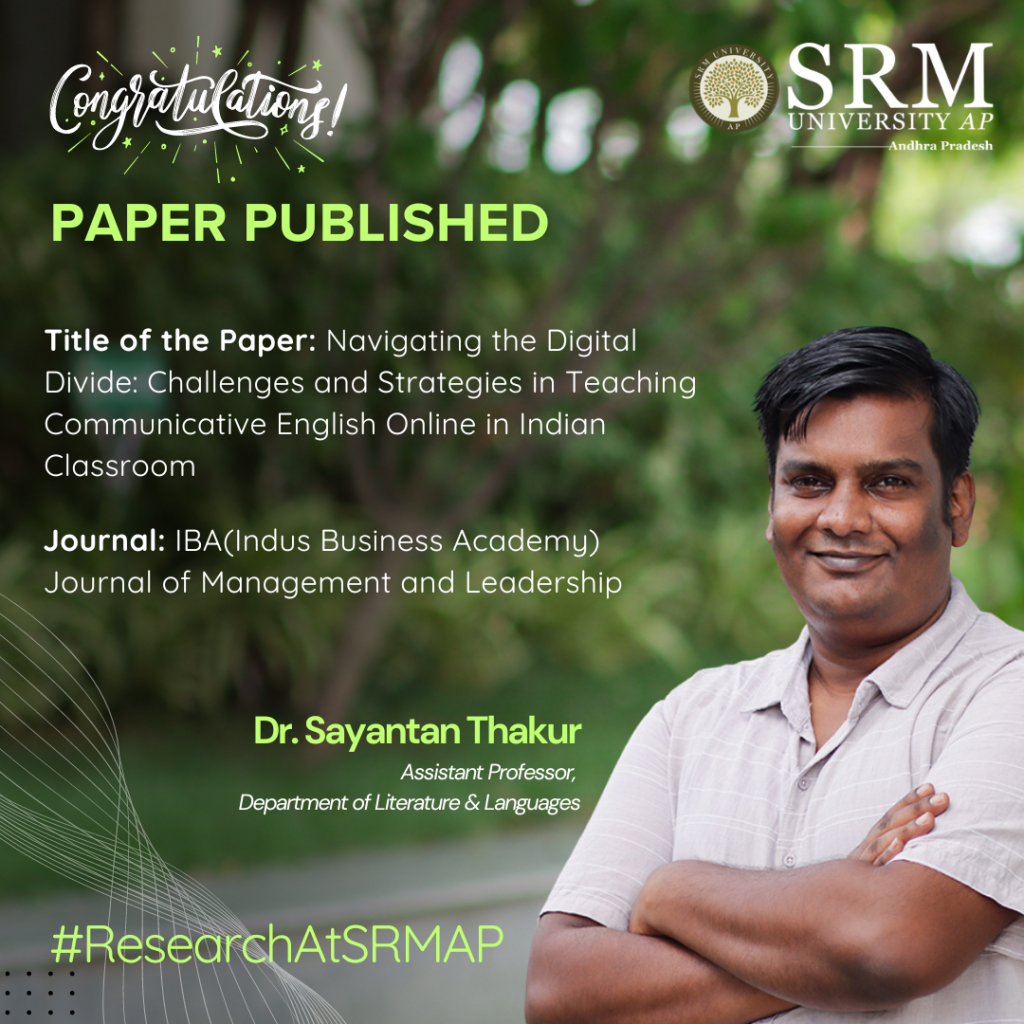
In the context of online English education in India, the “digital divide” has emerged as a significant obstacle, especially for students from rural or underprivileged areas. Dr Sayantan Thakur, Assistant Professor at the Department of Literature and Languages in his article introduces a research study titled “Navigating the Digital Divide: Challenges and Strategies in Teaching Communicative English Online in Indian Classrooms,” which aims to address the unequal access to online learning tools.
Abstract
The advent of online learning platforms is providing new opportunities for English language learning (ELL) in India. However, there is a significant challenge posed by the digital divide – the gap in accessing technology. This study investigates what causes the digital divide in internet ELL classrooms such as infrastructure limitations, device ownership and usage, and digital literacy skills; and how they affect student engagement, development of communication skills, and overall learning experiences. It suggests ways to bridge this gap which include government policies on infrastructure development; affordable tech solutions like mobile apps; teaching programs that enhance digital literacy among learners; support for teachers involved in web-based pedagogy. Through these recommendations, education stakeholders can create an inclusive cyberspace for all students where their communication abilities will be nurtured throughout different parts of India.
The Practical Implementation
The practical implementation of your research on “Navigating the Digital Divide: Challenges and Strategies in Teaching Communicative English Online in Indian Classrooms” has far-reaching social implications. By addressing the digital divide, your work can help level the playing field in education, especially for students from underprivileged backgrounds.
Improved Access to Education: Implementing strategies like infrastructure development, affordable mobile-based learning tools, and digital literacy programmes can provide more students, especially in rural and low-income areas, access to online English learning resources. This improves their chances of acquiring essential communication skills, opening doors to better job opportunities.
Empowering Teachers: Equipping teachers with digital tools and training enables them to deliver more effective online lessons, increasing student engagement and success rates.
Reducing Inequality: Bridging the technology gap can reduce educational disparities between urban and rural areas, promoting social mobility and reducing the long-term impacts of inequality.
Building a Digitally Literate Society: Enhancing digital literacy among students and teachers fosters a society better prepared for the demands of the modern workforce, ultimately contributing to economic growth and social inclusion.
Future Research Plans
- Regional Literature in Translation
- Tantric Tradition and Eastern Indian Literature
- Folk Music of Bengal
- Indian Philosophy, Aesthetics & Literature
- Published in Departmental News, English Current Happenings, English news, News, Research News
Marketing Wizard Delivers Lecture on D2C Marketing
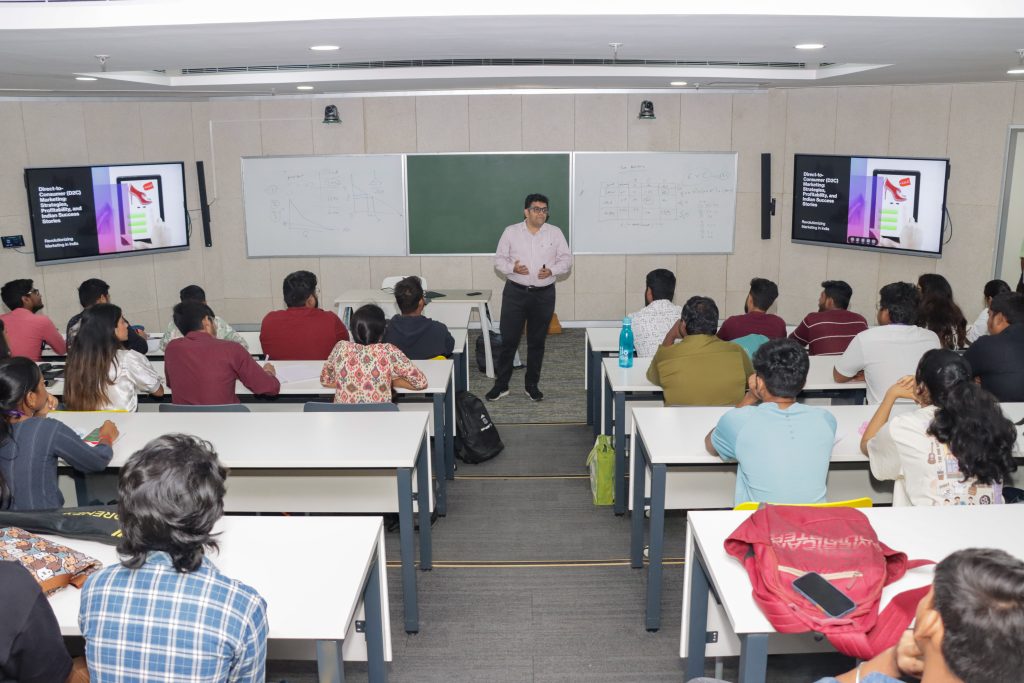 The students of Paari School of Business (PSB) had a memorable experience when Mr Siddesh Joglekar joined as a guest lecturer at SRM University-AP. The CRCS team’s dedicated efforts and the unwavering support of Prof. Bharadwaj Sivakumaran, Dean of PSB, made this unique opportunity possible. Students had the privilege of engaging in a personal interaction with the esteemed guest on September 18, 2024.
The students of Paari School of Business (PSB) had a memorable experience when Mr Siddesh Joglekar joined as a guest lecturer at SRM University-AP. The CRCS team’s dedicated efforts and the unwavering support of Prof. Bharadwaj Sivakumaran, Dean of PSB, made this unique opportunity possible. Students had the privilege of engaging in a personal interaction with the esteemed guest on September 18, 2024.
During the lecture Mr Joglekar shed light on various aspects of professional growth and marketing strategies. He placed significant emphasis on the need to foster a collaborative environment and recognising the contributions of peers.The lecture also delved into the imporatance of networking for career advancement, especially through ones’ Alumni Associations
Mr Joglekar delved into the expansive potential of Direct to Consumer (D2C) marketing, using examples from renowned companies like Twitter, Walmart, Instagram, Zomato, Amazon, Tesla, and Google to illustrate the evolution of brand images. A poignant quote from Mr Joglekar, “Companies are transformed into brands by people who dare to dream,” encapsulated the essence of the discussion, emphasising the role of visionary individuals in shaping successful brands.
Interactive elements were woven into the session, including an activity where students were tasked with creating logos that branded themselves, thus reflecting a unique aspect of their identity. This hands-on approach not only made the learning process engaging but also provided practical insights into branding.
A comparative analysis between traditional retail and D2C highlighted key differences such as distribution channels, pricing strategies, and brand control, offering a deeper understanding of the contemporary marketing landscape. The concepts of Customer Acquisition Cost (CAC) and Life-Time Value (LTV) were also explored, underscoring their importance in building a strong brand identity.
As the session neared its conclusion, Mr Joglekar introduced an innovative activity that involved reverse engineering an advertisement concept, inspired by the 2022 ad campaign featuring Mr Neeraj Chopra for Cred. This exercise prompted students to think creatively and apply the concepts discussed in a practical context.
The session wrapped up with a Q&A segment, where discussions ranged from market profitability to the advantages of D2C marketing, allowing for a comprehensive review of the topics covered. Ms Andrea Benedict extended a vote of thanks on behalf of the student fraternity of PSB, culminating in a group photo session that captured the essence of the enriching experience.
- Published in Departmental News, News, Paari Current Happenings, paari-guest-lectures
AARAVAM 2024 Concludes with a Bang!
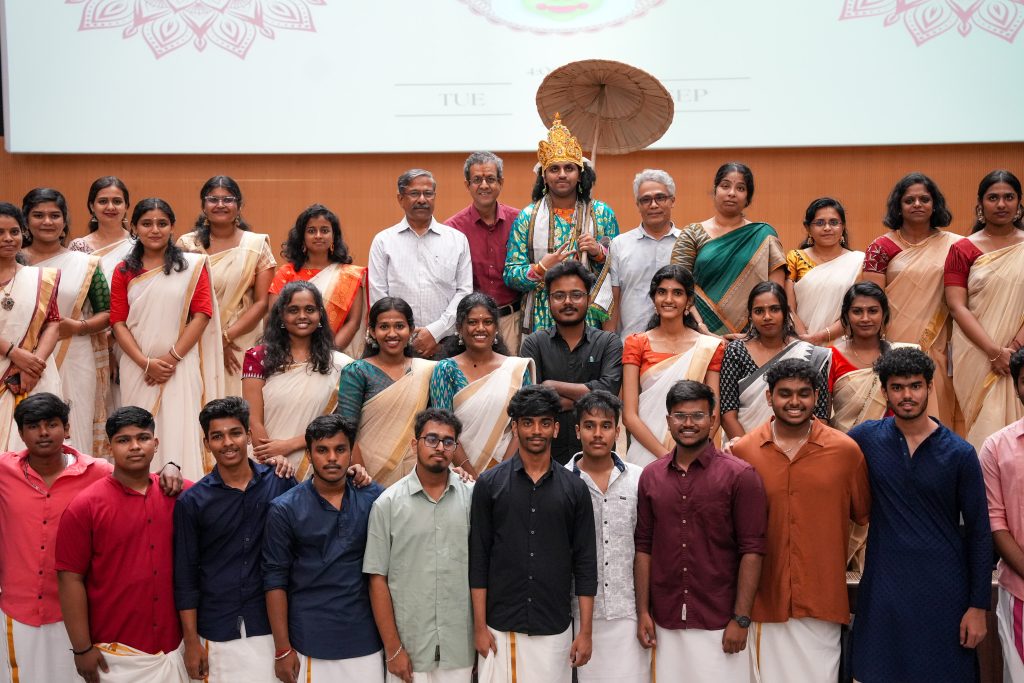 Unity in diversity is more than just a saying at SRM University-AP; it’s the heart and soul of our campus. With over 6000+ students from various states and union territories and an international diversity representing 24 countries each festival serves as a bridge, drawing a closer bond amongst all. The Onam celebration, Aaravam 2024, on campus was no different, the varsity celebrated Onam on September 17, 2024.
Unity in diversity is more than just a saying at SRM University-AP; it’s the heart and soul of our campus. With over 6000+ students from various states and union territories and an international diversity representing 24 countries each festival serves as a bridge, drawing a closer bond amongst all. The Onam celebration, Aaravam 2024, on campus was no different, the varsity celebrated Onam on September 17, 2024.
The celebration orchestrated by the Directorate of Student Affairs oversaw the decoration and resplendent showcase of the Kerala culture through dance and music. The festivities commenced with the traditional Thiruvathirakali, a dance that saw students gracefully attired in the Kerala Kasavu saree, enhancing the aesthetic appeal of the day, followed by an array of cultural performances that captivated the audience. The highlight of the celebration was the appetising Onam payasam, which brought in the sweetness of the festival itself.
The appearance of King Mahabali brought a wave of joy among us all. In a heartwarming gesture, our Kerala community shared a captivating video that told the story of Onam, welcoming everyone to partake in the tradition, truly reflecting SRM AP‘s embrace of diverse cultures.
The event was graced by the presence of Registrar Dr R Premkumar, the Deans of the three schools, and King Mahabali himself, along with our faculty, staff and students. It was a day that drew us all closer, celebrating Kerala’s rich cultural tapestry. More than just a celebration, it was a reminder of the beauty in our diversity and the strength in our unity.
- Published in Departmental News, News, student affairs news


